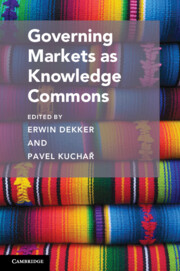Book contents
- Governing Markets as Knowledge Commons
- Cambridge Studies on Governing Knowledge Commons
- Governing Markets as Knowledge Commons
- Copyright page
- Contents
- Contributors
- Preface
- Acknowledgments
- Introduction
- 1 The Contribution Good as the Foundation of the Industrial Revolution
- 2 On the Social Evolution of Knowledge
- 3 Individual Sovereignty and Coproduction of Knowledge Governance
- 4 Common Sense Commons
- 5 Conventions as Shared Cognitive Infrastructures
- 6 Property Rights, Knowledge Commons, and Blockchain Governance
- 7 Knowledge Commons, Social Infrastructures, and Informal Markets
- 8 Entrepreneurship and Governance in the Scotch Whisky Knowledge Commons
- 9 Trolling in the Deep
- 10 Crowdfunding the Queer Museum
- 11 Understanding Different Qualities of the Knowledge Commons in Contemporary Cities
- References
11 - Understanding Different Qualities of the Knowledge Commons in Contemporary Cities
Published online by Cambridge University Press: 09 December 2021
- Governing Markets as Knowledge Commons
- Cambridge Studies on Governing Knowledge Commons
- Governing Markets as Knowledge Commons
- Copyright page
- Contents
- Contributors
- Preface
- Acknowledgments
- Introduction
- 1 The Contribution Good as the Foundation of the Industrial Revolution
- 2 On the Social Evolution of Knowledge
- 3 Individual Sovereignty and Coproduction of Knowledge Governance
- 4 Common Sense Commons
- 5 Conventions as Shared Cognitive Infrastructures
- 6 Property Rights, Knowledge Commons, and Blockchain Governance
- 7 Knowledge Commons, Social Infrastructures, and Informal Markets
- 8 Entrepreneurship and Governance in the Scotch Whisky Knowledge Commons
- 9 Trolling in the Deep
- 10 Crowdfunding the Queer Museum
- 11 Understanding Different Qualities of the Knowledge Commons in Contemporary Cities
- References
Summary
For the last ten years many (local) policy makers and entrepreneurs have been fascinated with the economic potential of so-called creative industries and smart cities. This fascination was stirred by the conviction that creativity boosts the (local) economy. And because the urban economy is good for 70 percent of global GDP, and as more than half of the total world’s population lives in cities, creative industries are all the more relevant both socially and economically. This chapter explores a new approach to making sense of social and cultural qualities of cities in the new economy. This is the so-called Value based approach (VBA) with novel concepts, such as shared goods and practices, willingness-to-contribute (WTC) (Klamer, 2016), and, a key notion in our application, a commons, more precisely, the knowledge commons.
- Type
- Chapter
- Information
- Governing Markets as Knowledge Commons , pp. 256 - 276Publisher: Cambridge University PressPrint publication year: 2021
References
- 1
- Cited by

